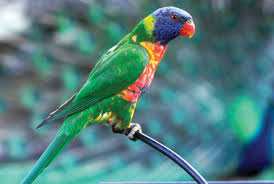
Lorikeet
Conditions of detention
Lorikeets require a spacious cage or aviary that allows for ample movement and play. The enclosure should be equipped with horizontal bars for climbing, perches, toys, and various enrichment activities. It’s important to place the cage in a well-lit area away from drafts and direct sunlight.
Useful Fact: Lorikeets are very active birds and benefit from several hours of supervised out-of-cage time each day for exercise and social interaction.
Nutrition and diet
Lorikeets have a specialized diet that primarily consists of nectar and pollen. In captivity, they require a diet of commercial lorikeet nectar mix supplemented with fresh fruits and vegetables. Apples, grapes, berries, and leafy greens are excellent additions to their diet.
Useful Fact: Unlike most parrots, lorikeets have a brush-tipped tongue that is adapted to their diet of nectar and pollen. It’s important to provide a diet low in iron to prevent iron storage disease, which they are prone to.
Health
Lorikeets are generally healthy birds but can be prone to certain health issues such as beak and feather disease, iron storage disease, and bacterial infections. Regular veterinary check-ups are crucial for maintaining their health.
Useful Fact: Monitoring their droppings can provide early signs of health issues; changes in color or consistency can indicate a problem. Lorikeet droppings are typically watery due to their liquid-based diet.
Grooming and care
Lorikeets groom themselves by preening their feathers and enjoy regular baths. Providing a shallow dish of water for bathing or misting them lightly with water can help maintain healthy feathers.
Useful Fact: Lorikeets are messy eaters due to their liquid diet, so regular cleaning of their cage and surrounding areas is essential to maintain hygiene.
Education and training
Lorikeets are intelligent and can be trained to perform simple tricks and mimic sounds. Positive reinforcement and patience are key to successful training.
Useful Fact: Training sessions should be kept short (5-10 minutes) to maintain their interest and reinforce learning. Lorikeets are highly curious and respond well to interactive play and training.
Toys and entertainment
Toys are essential for the mental stimulation and well-being of lorikeets. They enjoy a variety of toys, including swings, bells, and puzzles. It is important to rotate toys regularly to keep them engaged.
Useful Fact: Lorikeets enjoy toys that encourage chewing and manipulation, as these activities help keep them mentally stimulated and prevent boredom.
Safety
Safety considerations include ensuring that the cage is free of sharp edges and that the bar spacing is appropriate to prevent escape or injury. Keep them away from toxic substances, including certain household plants and fumes.
Useful Fact: Avoid using non-stick cookware around lorikeets, as the fumes can be toxic and even fatal to birds.
Accessories
Lorikeets require a variety of accessories for their cage, including perches, food and water dishes, and toys. Accessories should be made from safe materials like untreated wood or stainless steel.
Useful Fact: Natural wood perches help maintain foot health by varying the pressure points on their feet compared to uniformly shaped perches.
Socialization
Lorikeets are social creatures and thrive on interaction with humans and other birds. They should not be kept in isolation for extended periods.
Useful Fact: If you have a single lorikeet, spending time with them daily is crucial for their mental health and well-being. Lorikeets can become quite attached to their owners and enjoy being part of family activities.
Travel and Transportation
When traveling with lorikeets, use a secure and well-ventilated travel cage. It’s important to keep the cage covered during transport to reduce stress.
Useful Fact: Familiarize your lorikeet with the travel cage by placing it in their living space and allowing them to explore it before any trips.
Behavior and psychology
Lorikeets exhibit a range of behaviors and vocalizations that indicate their mood and health. Understanding these signals is essential for proper care.
Useful Fact: Lorikeets are known for their playful and social nature. They can be quite vocal and enjoy engaging with their environment through exploration and play.
Legal aspects
In most areas, there are few legal restrictions on keeping lorikeets as pets, but it is important to ensure that any lorikeets purchased are from reputable breeders or pet stores, and not taken from the wild.
Useful Fact: Always check local regulations to ensure compliance with laws regarding pet ownership and breeding, as some areas may have specific requirements.


